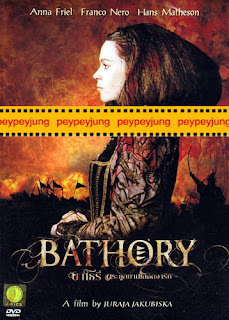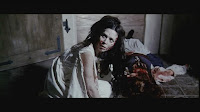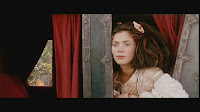This is a 2008 film directed by Juraj Jakubisko and starring Anna Friel as Erzsébet Báthory. It is a long, long film clocking in around two and a quarter hours and is split into three main movements as we look at the countess’ life.
As you have probably guessed there is a significant lack of vampiric element if it is getting an honourable mention and I will explain, of course, how that has happened. The film follows Erzsébet, being betrothed as a child to Ferenc Nadasy (Vincent Regan) who then goes to war for Hungary, against the Turks.
The early part of Erzsébet’s life is marked by the fact that she lost a male child at birth and had two girls. That a marital rape caused her to miscarry a further child, when Ferenc returns briefly from war, and how he sent her a captured Italian painter, Merisi (Hans Matheson), as a gift. We see Erzsébet and Merisi grow closer and, indeed, fall in love (Erzsébet does seem to love Ferenc but is a neglected wife). We also see that she is a skilled healer and keeps a book of those she has healed (rather than butchered).
It is in this section that we get our main mention of vampirism. A maid, Erika (Michaela Drotárová), is raped by Ferenc’s second in command Thurzo (Karel Roden) and so Erzsébet gives the girl a two pronged dagger to defend herself with. When a body of a steward turns up with punctures in the neck the local priest, Ponicky (Antony Byrne), suggests vampires but Erzsébet recognises the wound – the steward has tried to rape Erika.
Erzsébet has Merisi dissect and draw the corpse – so as to help him paint human subjects and Erika witnesses this. In her imagination she sees the Countess develop fangs and becomes convinced that she is a vampire. In truth it was a wild imagination but her actions, including a theft, cause Erzsébet to react to the girl in anger – who tries to run and falls from a window. During this we hear that Erzsébet has a blood complaint and, it appears, mental health issues.
When Ferenc returns home he becomes suspicious of Merisi and tries to poison him but Erzsébet drinks the draft. Fearing for his wife’s life he calls a healer, Darvulia (Deana Jakubisková-Horváthová) who does save the Countess. She prophesises events to come, including the Countess’ fall in ten years, but also a son, Pál (Derek Pavelcík). Darvulia also uses herbs to cure her blood condition (we see supernatural events like a cut miraculously closing) and keep her looking young. There is a potion and a bath of red herbs (rather than blood).
When Ferenc dies, Thurzo turns his attention to Erzsébet’s wealth, using his wife’s knowledge of herbs to attack the Countess and cause her to have momentary psychotic breaks through alkaline mushrooms secreted in her potion. Erzsébet may, at these times, have killed a maid – which she is allowed to do as a noble – but any hint of her crimes, for which she is famously known, are not shown as the film weaves a story of superstition manipulated to steal the wealth from the woman who is a loving mother and (relatively) benign when it comes to her subjects. Legend, the film suggests, is created by the victors and rumour is more interesting than fact. The presence of the witch Darvulia has created a rumour base that her enemies can use.
The film itself is absolutely sumptuous, with wonderful vistas painted across the screen, lovely costuming and gorgeous cinematography. The pace is slowed with symbolic moments that add a surreal edge to the film and Anna Friel’s performance is simply magnificent and yet the film also has moments so odd that one questions both the scriptwriting and direction. Most of this surrounds a monk, Peter (Bolek Polívka), and his neophyte Cyril (Jirí Mádl), sent by the Catholic church to spy on the Countess. Peter is almost the polar opposite of the rumour mill. Convinced of her guilt, his spying leads him to believe in her honesty and goodness. However he is set up like a medieval James Bond with clockwork skis/roller skates, parachutes and even a primitive camera. It was ridiculous and his necessary role was undermined with devices that had no place there and comedy elements that were noticeably out of place as though tagged on from another film.
That aside this is worth a watch, but gird yourself for a lengthy experience. However, from a vampire genre point of view the couple of vampiric imaginings would hardly touch the sides and this mention comes more for the fact that this features Báthory and her story and (as much as it has been aimed towards her innocence) that automatically makes it of genre interest.
The imdb page is here.
Saturday, May 15, 2010
Subscribe to:
Post Comments (Atom)























3 comments:
Sumptuous period dresses and vampiric overtones? Hm, sounds (at least partly) like my kind of film.
I have seen this film (however the Slovak and Hungarian movies were constantly in idiot childish fights about the laws etc) and all I can say that this is the best film of all the mentions of Erzsébet Báthory in the media. She was neither a saint not a demon, but a woman with tragic life and this is wonderfully pictured in the film. Though no historical evidence appears that Merisi (Caravaggio) has ever visited these lands, and we do not have evidence that Ferenc raped his wife, everything seems to be quite in place within the film.
From me, an absolute 10/10, mainly because the way it handles Erzsébet and the truth it gives her.
Cheers for the comments guys. Obviously, from a vampire genre point of view this only is a mention but as a period drama it is sumpruous and likely closer to a truth than the legends.
However the James Bond monk still cheapens the film.
Post a Comment